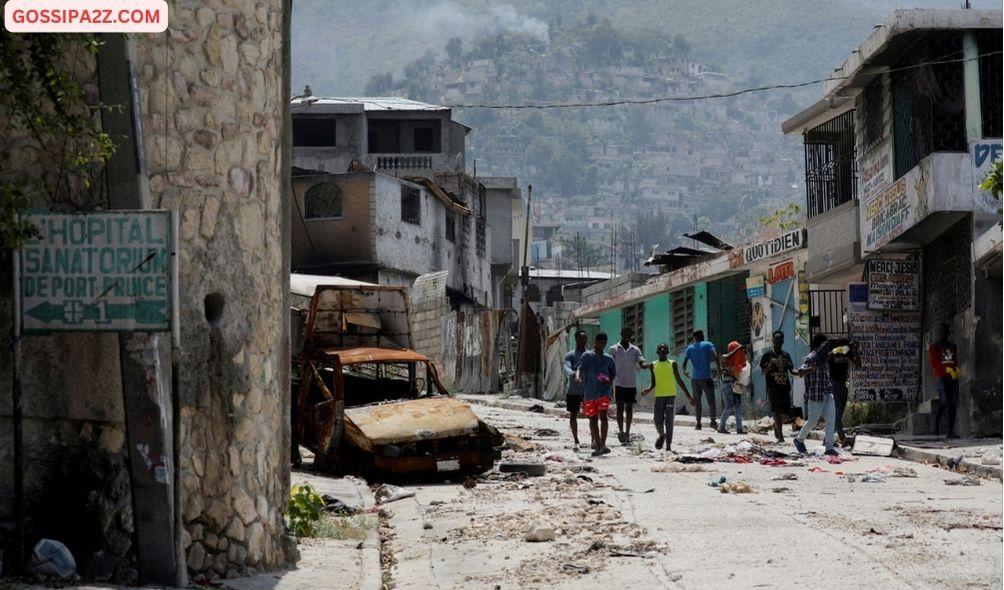Haiti Suspected Gang Members Set On Fire As Conflict Spreads To Capital Suburb
Members believed to be part of a gang were fatally shot amid an assault targeting the Petion-Ville area situated on the southern fringes of Haiti’s capital. This incident, marked by confrontations involving law enforcement and residents, suggests a resurgence of vigilante actions in the absence of state authority.
The most recent eruption of violence occurs while the uncertain political fate of the crisis-hit Caribbean island nation remains unresolved.
A Reuters journalist witnessed the death and subsequent burning of two individuals believed to be associated with a gang, one of whom was identified as Makandal, a reputed leader. Prior footage reviewed by Reuters depicted the bodies on the street, with one individual missing their hands, and being dragged.
According to information from police sources, as reported by Radio RFM, there was a confrontation involving residents in Petion-Ville, situated on the southern outskirts of the capital city, Port-au-Prince.
Nearly twelve months ago, a cluster of inhabitants from Port-au-Prince took the law into their own hands, lynching and immolating approximately twelve individuals suspected of being affiliated with gangs. This incident marked the inception of the Bwa Kale movement, characterized by vigilantism, an approach to justice that human rights organizations assert has occasionally involved collaboration with members of Haiti’s law enforcement.
POLITICAL VACUUM
On Wednesday, Le Nouvelliste stated that there were reports of at least 15 fatalities from assaults in the vicinity of Petion-Ville, an area housing numerous luxury hotels and approximately a dozen embassies. In response, residents took refuge in their homes, while armed individuals conducted new attacks to the east of the urban center.
Petion-Ville lies in proximity to hotels that were recently targeted by gang leader Jimmy “Barbeque” Cherizier, who issued threats against the establishments, indicating his intention to pursue hotel proprietors harboring veteran politicians.
Even though Prime Minister Ariel Henry had previously promised to resign last week, a request made by the influential gangs who hold sway over much of Port-au-Prince, unrest persists as Henry remains abroad, unable to return.
In the meantime, the temporary leader has prolonged the nightly curfew that was initiated earlier this month.
To address the growing lawlessness following the assassination of the country’s former president in 2021, international leaders have facilitated the formation of a presidential transition council. However, the composition of this council remains uncertain, and politicians considering participation have faced threats from gangs.
ALSO READ:
- Kalonzo Calls Out Ruto Over Abductions- “You Are The Commander-In-Chief of the Abduction Squad”
- Ruto & Raila Rattled as Gusii leaders Rally Behind Matiang’i’s 2027 Presidential Bid
- Elon Musk Eyeing Liverpool Purchase? Father Says It’s a Possibility
- Why the US Embassy Will be Closed on Thursday, January 9
- Kibet Bull Finally Breaks Silence on Chilling Abduction Ordeal
Last week, American authorities anticipated that the composition of the council would be finalized within a few days. However, certain factions chosen for representation either opposed the proposal or couldn’t rally behind a single leader. Those excluded have condemned the council for favoring members of factions they deem corrupt.
In the meantime, security measures at embassies have been enhanced, and certain countries have initiated the evacuation of their citizens abroad. The Dominican Republic announced on Tuesday that it had successfully evacuated approximately 300 individuals, among them staff members from the European Union, the World Bank, and the International Monetary Fund. Given the closure of the airport, the United States declared its plan to evacuate its citizens via helicopter.
In Carrefour Feuilles, a purported gang leader convened supporters on Tuesday, aiming to regain authority over the area following intense clashes that displaced thousands from their residences last August.
Large numbers of people have been forced to leave their homes in Haiti, with thousands losing their lives amidst widespread incidents of sexual assault, setting fires, and kidnappings for ransom. Meanwhile, the cost of food is rising sharply, and hospitals are facing shortages of essential resources like blood and oxygen.
Haiti Suspected Gang Members Set On Fire As Conflict Spreads To Capital Suburb
